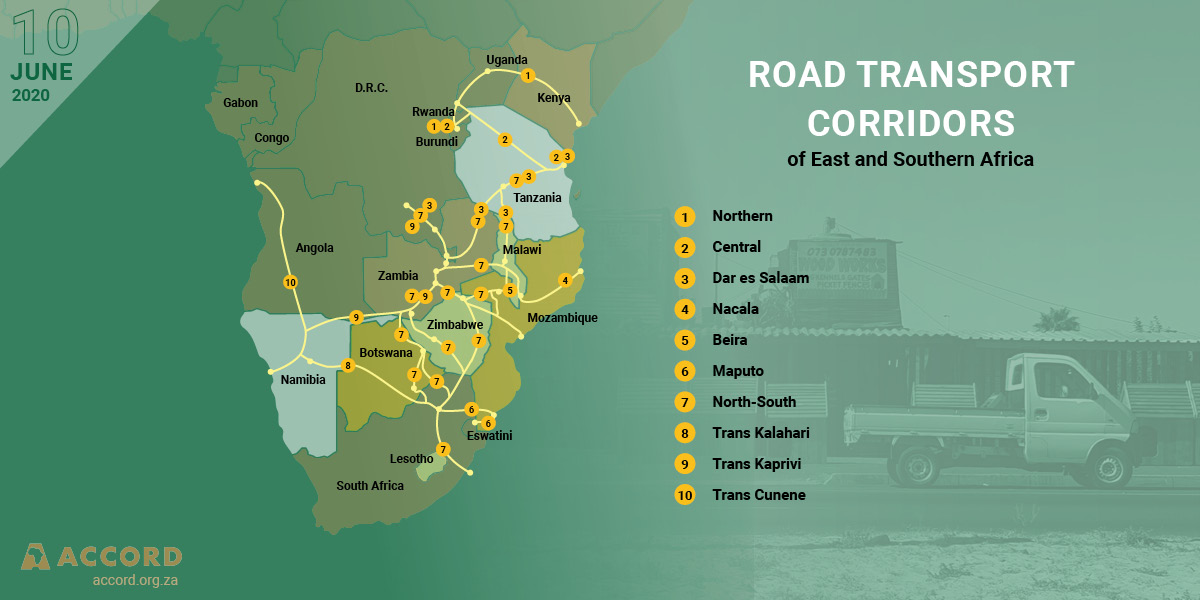To ensure that access to essential goods was not disrupted, cargo transportation was declared an essential service by most countries in eastern and southern Africa and the borders remained open for cargo. However, those border posts that were considered as not essential for ensuring access to sub-regional and global markets were closed. For example, on 15 March 2020, President Cyril Ramaphosa closed 35 of South Africa’s 53 land border posts with regional neighbours to control the spread of COVID-19. Those that remained open were along the main transport corridors, as shown in the accompanying map.
The central and northern corridors link landlocked Burundi, Rwanda, Uganda and Sudan with the Mombasa and Dar es Salaam ports, and the north–south corridor connects the Democratic Republic of the Congo (DRC), Zambia, Zimbabwe and Malawi to the port city of Durban. Other transport corridors include the Trans-Kaprivi, Trans-Kalahari and Trans-Cunene highways. Border posts along these transport corridors remain open, but operate under COVID-19 restrictions. However, illegal, informal cross-border trading activities continue due to the nature of porous borders along some transport corridors notwithstanding COVID-19 restrictions. For instance, economically stricken Zimbabweans have been captured on social media platforms crossing the Limpopo River near Beit Bridge border post into South Africa where they exchanged cigarettes and beer, among other items, with Musina residents for an assortment of food groceries and other items.
In the Southern African Development Community (SADC), South Africa routinely coordinates its COVID-19 response with other countries in the region amid the absence of an agreed regional approach in support of cross-border trade. In this regard, regional leaders have declared cross-border cargo truck drivers transporting food, medical supplies and other essential goods to regional destinations as essential service staff. The East African Community’s (EAC) strategy is that cargo truck drivers from port countries (Tanzania and Kenya) are not allowed to enter into EAC landlocked countries. Instead, member states have agreed to permit the swapping of truck drivers at transport corridor border posts, after satisfying all mandatory COVID-19 restrictions and hygiene requirements. Hence, the cargo trucks are driven by drivers residing in recipient member states to their destinations, after which the cargo trucks are returned to the border posts. This shows that sub-regional countries have strengthened their measures of surveillance, screening and testing at border ports of entry to ensure the health and safety of customs, immigration, police, veterinary and other officials managing the border posts, and truck drivers.
Whilst the exact impact COVID-19 will have on specific African countries is not yet known, it is already clear that some countries’ trade will be significantly affected.
Tweet
COVID-19-related cross-border trade restrictions have since become a blessing in disguise, as they have encouraged people to consume local products. Other sectors of the economy have started to use locally produced raw materials in their value addition processes. Subsequently, this reduces the demand for imported finished products including food items, and semi-finished or raw materials for use in local industries. In addition, some sub-regional countries have supported their respective COVID-19 trade measures with various financial bailouts aimed at stimulating domestic firms’ productive capacities and export competitiveness. These financial stimulus packages vary from country to country, depending on size, economic structure and the leadership’s ability to harness trust and support from relevant stakeholders.
Other countries have adopted innovative ways of supporting production and export capabilities, such as embracing digital systems efficient in cross-border transactions to protect their respective regional market niche. At a regional level, more diversified economies (such as South Africa and Kenya) will most likely experience less severe effects compared to less diversified economies, in the wake of reduced demand for exports and reductions in supply from import sources. Further, commodity-dependent countries, including DRC and Zambia, are likely to be hit hard by the crisis, following reduced demand for copper and cobalt.
Dr Richard Kamidza, is an independent international development consultant specialising in the regional integration process of the Southern African region (COMESA, SACU and SADC). His main focus is on trade and regional integration analysis, coordination of trade negotiations programmes, management of regional technical assistance, building institutional technical capacity and skills, trade agreement technical assistance and evaluating European Union (EU) funded institutional programs and projects.

